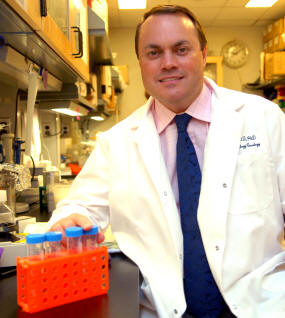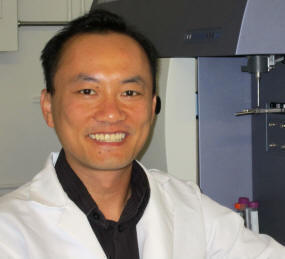2012 Biomedical
Research Collaboration Award
Memphis, TN, November 23, 2012 -- The Hartwell
Foundation officially announced a
Biomedical
Research Collaboration Award to
David C.
Lyden, MD, Ph.D., 2008 Hartwell Investigator and
Associate Professor, Departments of Pediatrics, and Cell
and Developmental Biology, Weill Medical College of
Cornell University and
Jack D. Bui,
MD, Ph.D., 2010 Hartwell Investigator and Assistant
Professor, Department of Pathology, University of
California, San Diego, for their proposal “Overcoming
Cancer Metastasis: Exosomes as Metastatic and
Anti-Metastatic Factors”. The researchers will receive
$635,028 in combined direct cost over three years. Both
Cornell and UC San Diego are named to the Foundation’s
2012 Top Ten Centers of
Biomedical Research.
Approximately 20% of all children diagnosed with cancer
die, most often due to metastasis. For two childhood
cancers the survival rate is especially low; a mere 51%
of children with medulloblastoma survive, and for
certain sarcomas, the rate of survival nationwide is a
dismal 30-36%. Moreover, for survivors, the side effects
of conventional chemotherapy and radiation can also have
devastating consequences on normal development. For
example, many children with medulloblastoma suffer from
deafness and lowered IQ after radiation therapy.
Clearly, new approaches to treating these childhood
cancers are desperately needed.
David Lyden is a pediatric neuro-oncologist and clinical
research scientist who is a specialist in brain tumor
biology. As a 2008 Hartwell Investigator he has made
several fundamental discoveries about the role of bone
marrow-derived stem and progenitor cells in tumor
formation of new blood vessels and in tumor metastasis.
The Lyden lab has described how medulloblastoma brain
tumors that rarely metastasize and seem to spread by
local extension, actually release small membranous
vesicles (exosomes) containing protein, DNA, and other
factors. Remarkably, the released exosomes appear to
‘educate’ bone marrow cells to inhibit metastasis of
high grade tumors. For example, bone marrow obtained
from mice with tumors that are poorly metastatic can
inhibit metastasis of highly metastatic tumors.
Conversely, bone marrow that has been exposed to
exosomes from highly metastatic tumors can facilitate
metastasis of poorly metastatic tumors. Lyden has
identified c-MET as a critical protein present in the
exosomes, which when targeted to bone marrow can induce
metastasis-promoting activity, making this the first
demonstration of the transfer of oncogenic information
from the cancer cells to other cells in the tumor
microenvironment.
Jack Bui is a board-certified clinical pathologist and
research scientist. He serves as Associate Director of
the Immunogenetics and Transplantation Laboratory in the
Department of Pathology and the Director of the UCSD
Diagnostic Immunology and Immunogenetics Laboratory at
the Center for Advanced Laboratory Medicine. As a 2010
Hartwell Investigator, his research focuses on mouse
models of tumor formation; how the innate immune system
recognizes developing tumor cells and how immune cells
can be manipulated to control tumor formation. The Bui
lab has described how certain sarcoma cancer tumor cells
release a protein cytokine called IL-17D that will cause
bone marrow cells to reject high grade tumors.
Lyden and Bui will combine their areas of expertise to
combat childhood cancer. Together, they will dissect the
molecular make-up of exosomes released by
medulloblastomas and sarcomas. They seek to define the
mechanism by which exosomes educate bone marrow derived
cells to promote or inhibit metastasis and to what
extent IL-17D anti-tumor activity can antagonize the
metastasis-promoting activity of c-MET present in
exosomes. By understanding the “exosome signature” from
metastatic and non-metastatic medulloblastomas and
sarcomas they plan to identify candidate therapeutic
targets for these childhood cancers.
Exosomes are small membranous vesicles on the order of
40-100nM diameter derived from membrane-bound
intracellular compartments inside of cells. Once formed,
the intracellular vesicles are secreted into the
extracellular environment as exosomes, which may then
circulate in the lymph and blood. The composition of
formed exosomes will vary depending upon their origin,
which is important because they are known to have the
capability to fuse with other cells in a process that
may transfer genetic material, proteins and other
mediators as a unique means of cell-cell communication.
While the precise physiologic function of exosomes
remains unknown, they are now recognized as playing an
important role in the promotion of tumor growth and
metastasis.
Metastasis is a multistep process that requires tumor
cells to acquire certain properties that will allow them
to escape from the primary tumor site. Host cells within
the tumor microenvironment play a key role in
influencing metastatic behavior, and many are derived
from the bone marrow. Cell-to-cell communication has
been thought to occur principally through the release of
soluble cytokines (chemicals that may stimulate or
inhibit the function of surrounding cells), but it is
now known that exosome-based transfer of information
makes an important contribution, as well.
Fostering collaborations between investigators of
complementary scientific strengths is one of the
objectives of The Hartwell
Foundation Mission to fund innovative, early-stage
applied biomedical research with the potential to
benefit children.
|
|

2008 Hartwell Investigator
David Lyden, MD,
Ph.D., Cornell University

2010 Hartwell Investigator
Jack Bui, MD, Ph.D., University of California, San Diego
Biomedical Research Collaboration Awards
Individual Biomedical
Research Awards
Top Ten Centers
HOME
|

